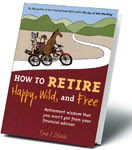Don't Forget to Include Your Spouse in Your Retirement Planning — Part 2
A post-retirement lifestyle shouldn't be limited to the retiree spending most of his or her time with their spouse. It's essential that each partner have his/her own interests. Bob Buford, author of a book called Game Plan, points to higher rates of divorce among those who retire early and find themselves with nothing to occupy their minds or engage their interest.
It's also important that couples give each other the freedom to pursue individual interests. Without the workplace to provide them with something to do, some retired individuals end up being lost souls, following their spouse wherever they go. Not giving their spouse the space and freedom to pursue their own interests can backfire and leave these retirees with even less company and less to do. Not surprisingly, some spouses have been known to go back to work once their retired partners drive them crazy.
The key is to organize your life so that you have time with your spouse and plenty of time to do your own thing. If you are male, your wife is not going to be happy if you rely on her to make you lunch each day while you sit around waiting for things to happen. In the same vein, if you are female, your husband won't relish your following him around everywhere, including the golf course and coffee bar where he meets his male friends to talk about "men things." Without their spouses being present, women should be able to enjoy the companionship of other women and men should be able to enjoy the companionship of other men.
Having your own space at home as well as giving your spouse her own space will be more important than it has ever been. While you were working, you had your own work area that you could call your own. It may have been a big office with several windows or it could have been a small area in a car manufacturing plant, which you could call your own. Especially for traditional couples, in which the husband has been working and the wife has been looking after the house, establishing personal space is essential.
Most couples must adjust to the fact that they will be spending a lot more time together after retirement. Trying to adapt to a life without the structure, sense of community, and personal identity that a job provided can bring up a lot of emotional and psychological issues, not only for the retiree, but also for the spouse. A situation where one person is totally engaged in life and the other isn't will sooner or later lead to relationship problems.
All things considered, couples are urged to figure out what dreams they do and don't have in common and how much time they plan to spend together when one or both retire. Some couples have spent virtually no unstructured time together during their working years, aside from two weeks on vacation every year or so. Once they retire, these couples realize their relationship lacks substance because they've been so devoted to their work over the years. This can present a problem. But it is also an opportunity to carry the relationship to a deeper level.
Quotes Can Be Liberated from the Retirement Sayings and Retirement Quotes Webpage on The Joy of Not Working Website






